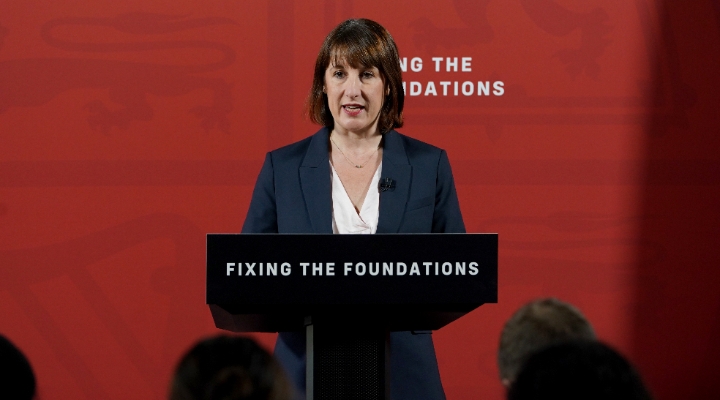Emma Wall: Hello, and welcome to the Morningstar Series 'Future Proof'. I'm Emma Wall and here with me today is Tony Stenning, Head of Retail U.K. for BlackRock.
Tony Stenning: Good morning, Emma.
Wall: Hello Tony. So we are approaching the Budget. There have been some leaks, as there always are. It's around annuities and the story seems to be that those who have already secured a guaranteed income for life, already retired with an annuity, may be able to exit from them.
Stenning: And that could be a boon for them, but it's also a big challenge for those particular consumers. More flexibility, more choices, clearly a good thing I believe, but you also need to go in with eyes open. You have secured that income for life, that is perhaps meeting your ongoing living cost, et cetera, and whilst the tantalising specter of getting your hands on a lump sum of cash right up front, please truly understand exactly what you are getting into.
Once you'll get that release of cash, what will that retain for you now today in the current interest rate environment? With interest rates very much lower, possibly than when you took it out? So really go into it thinking about what you may get when you may want to re-annuitise at a later point.
Wall: I can understand why this idea has been floated, because you do not want inequality amongst a generation, well, not even a generation, within people sort of 10 years apart. If you are retiring right now, well as of April 6, you can get your entire pension pot in cash if you want to.
Whereas if you retired, you know just a year earlier, or if you can push it back, because this came out in the last Budget, just two years earlier, you won't in that position. However, as you point out, that's not necessarily a reason to think that cash is the answer to your prayers.
Stenning: No, and I think the question is, how do you use those annuities within your broader portfolio? You can think of it that way. Perhaps in the past you have had all of your eggs in that particular basket and that may not be applicable to you, but please secure the government-led guidance that's out there and probably secure some real financial advice, about the actual amount that is going to be offered to you in this new and very nascent market.
It's going to not be particularly liquid for many years I would suggest until it builds up, and then, really understand again what number you need for your income requirements. Because you are right, post the financial crisis interest rates are much lower, what were you getting from your annuity pot? Perhaps not what you would have got five or six or seven years ago.
Should that mean that you immediately cash it all in? I think you need to really take a long hard look at that perhaps count to 100 before you do press that button and decide to jump in, because there are potential pitfalls that you need to navigate yourself around.
Wall: Presumably though this won't be a once in a lifetime offer, providing that the government – this exact same government gets in again post-elections. We've mentioned that interest rates are considerably lower than they have been historically.
As they rise and gilt yields rise, which is what annuity prices are pegged on, is there an argument to say that in perhaps five, 10 years' time when gilt yields are more like sort of 4%, 5%, 6%, 7%, perhaps you would like to cash in your annuity and maybe try and buy another one?
Stenning: You could argue that, that in a few years' times with interest rates more normal, whatever that means, but certainly higher than where they currently are, you could have a situation where it was perhaps more palatable, more amenable for you to think about cashing and maybe re-annuitising at that higher rate.
And I think this is where the Chancellor is trying to get into; more flexibility, not just to withdraw your cash and go and fritter it away, although we suggested that people aren't generally going to do that, obviously only time will tell, but you are right.
It doesn't mean in April you need to cash it in immediately. It means probably think about it, look at the interest rates environment, get that advice. If those two things converge to your benefit, then that's a really good thing I think.
We're going to be in retirement for much longer, 25, 30 years, not 15 or so that we were before. So being able to readjust and reset your time horizon that could be a really good thing.
Wall: While it's lovely to just only think of the retiree, the pensioner. We've got to be practical, we've got to think about what this means for the industry. I mean when George Osborne first announced the scrapping of compulsory annuity purchase, the share prices of insurers fell overnight considerably. That's because it does have a business impact and anything that has a business impact ultimately has a product impact, because if they don't have the cash to give you the good offer, they can't make it. Should we be considering that?
Stenning: So I think with change there is an inevitable sort of uncertainty about what that means. I think as the industry has done even with the annuity fall off as you've seen, we have 50% to 70% now a reduction in annuity purchases until we get post April.
I would say that rather annuities just disappearing forever, they are being deferred. People are looking about where they might be able to annuitise, at that point we're making earlier, when interest rates are more appropriate or beneficial for them.
So, I think that market hasn't gone away. We've seen in the U.S. a huge annuity market that you haven't needed to compulsorily annuitise ever.
So I think that will be very useful as a point to where the market kind of reacts and moves to. So, here again, nascent market, I think where the financial services industry needs to step up is, how we innovate, how we provide that service to our clients to help them navigate this.
Wall: Tony. Thank you very much.
Stenning: Thank you, Emma.
Wall: This is Emma Wall for Morningstar. Thank you for watching.





























